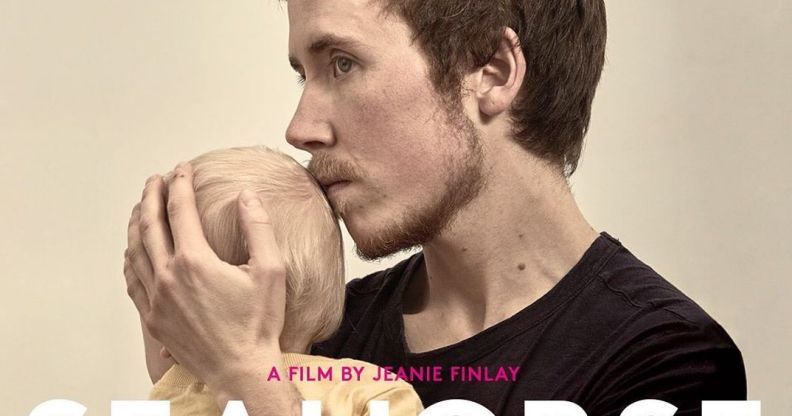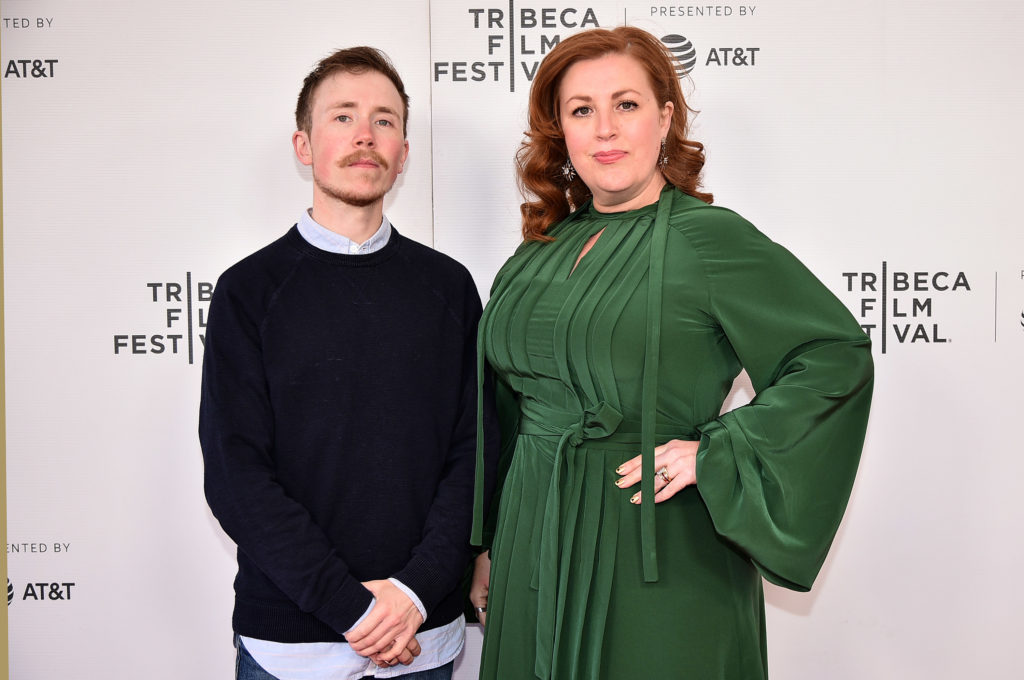The man who gave birth Freddy McConnell says ‘trans men having babies is a superpower’

The journalist previously documented his experience of giving birth in the film Seahorse. (Instagram/SeahorseFilm)
Freddy McConnell had been listening to parenting podcasts for years by the time he became a dad.
“It feels like the most important job I’ve ever had,” he tells PinkNews. “People would say to me, ‘Oh, you’ll be really keen to get back to work’ – because I took a whole year of parental leave – and I just wasn’t.
“I’d much rather play on the beach every day, or go to the woods, or watch Moana for the 500th time…”
But, like most trans men, he’d been told that going on testosterone would make him infertile.
“I guess I spent maybe three years thinking about whether I could start my family in that way, after discovering some YouTube videos of trans men in America documenting their pregnancies,” he continues.
“Because I had been told I would be infertile, it took me a long time to come to terms with whether I could do it, whether I was allowed to do it… all these ideas about gender roles and having transitioned. Was I allowed to do this thing that would be confusing and controversial for some people, even though to me it felt like a pragmatic decision?”
I had been told I would be infertile
He adds: “I’d never say I wanted to be pregnant. I’d say I wanted a family, I wanted kids, and it’s more that the pregnancy felt like the simplest and safest option for me.”
Freddy McConnell is a journalist for The Guardian who stopped taking testosterone to carry his own baby.
His pregnancy is recorded in the new documentary Seahorse, by the BBC in association with The Guardian, and directed by Jeanie Finlay, which follows him over three years, from trying to conceive to eventually giving birth.
Freddy says he decided to turn his pregnancy into a film to try to “help people understand more about trans folk” while “helping people like me discover that they can do this themselves – not that they have to or should do, but just that they can, because we’re given all of this misinformation”.
Pregnant trans men are not a new phenomena – in Australia alone, 228 trans men have given birth in the last decade – but they are rare enough that those that become public usually end up as sensationalised tabloid headlines.
Pregnant trans men are not a new phenomena
This was something Freddy was keenly aware of, and why he wanted to tell his story through Seahorse: “I wanted someone else to be focusing on the creative storytelling side. So I just thought, if I could find the right people to collaborate with then we could give it a shot.
“All the way along, I sort of knew that there was every chance that that just wouldn’t be possible, because of how difficult it is to be taken seriously as a trans person, to be in control of your own narrative.”
But Freddy McConnell found the collaborators he needed, and was able to concentrate on his pregnancy as other people filmed.

Freddy McConnell (L) and director Jeanie Finlay attend the “Seahorse” screening during the 2019 Tribeca Film Festival in New York. (Theo Wargo/Getty Images for Tribeca Film Festival)
“You’re just relying on encountering respectful, emotionally intelligent people I suppose,” he says of using the private London Women’s Clinic to get pregnant. “I definitely was apprehensive. But then all the language that the consultant used was anatomically correct, non-gendered language and they would always address me correctly and I was just, yeah, it was kind of mind-blowing.
“But I didn’t ever question it or overthink it, because I was focused on doing what I needed to do.”
In Seahorse, there’s a scene where a heavily pregnant Freddy says: “This is fucking awful. If men had to go through this all the time then you’d just never hear the end of it.”
“I know how I sound, and women don’t need to be told this – men need to get better with this!” he says, laughing. “Obviously, if this was something that all men experienced, you know – they’d figure it out! You wouldn’t just be expected to put up with vagueness and slightly moralistic advice-giving, as opposed to fact-based evidence.”

Freddy McConnell while pregnant. (Photo: Seahorse)
Being a dad, Freddy says, is something that he loves.
“I thought it would be something I would enjoy and I thought it would be a job that would suit me, you know, or like a role that would suit me, and it really is,” he says.
I just absolutely love getting to know him
“I love it. I love getting to know my child, I feel like they are an autonomous human being and they were from the day they were born, with their own personality and needs and wants and interests, and I just absolutely love getting to know him.”
And although the physical effects of coming off testosterone make some parts of the film hard to watch for Freddy, he doesn’t shield himself from it.
“I try to honour the experience,” he says. “I’m proud of myself and I’m proud of the film. It was amazing. This thing that we can do as trans men, having babies – I think it is kind of a superpower.”
Seahorse is in cinemas now and on BBC Two tonight (10 September) at 9pm

